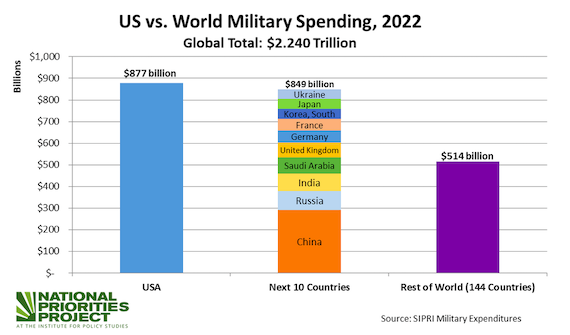World military spending reached a new record high of $2.4 trillion in 2022, with the United States spending the most by far.
Originally published in National Priorities Project.
( Foreign Policy in Focus) – World military spending has reached a new record high of $2.24 trillion in 2022, according to new data published by the Stockholm International Peace Research Institute (SIPRI). That’s up 3.7% since the previous year, including the steepest increase among European nations since the end of the Cold War over 30 years ago.
The United States remains the world’s largest military spender by far, with its $877 billion representing 39% of global military spending. That’s three times as much as the second largest spender, China, which spent $292 billion in 2022. And it’s about ten times as much as the next largest spender, Russia, which spent about $86 billion in the same year.
U.S. spending is more than the next ten countries combined, more than last year when it was larger than the next nine. Many of these next ten countries are geopolitically aligned with the U.S. — including Ukraine, which had the highest single-year increase in military spending SIPRI has ever recorded, rising 640% to $44 billion since Russia invaded.

Chart: National Priorities Project, Institute for Policy Studies
U.S. military aid to Ukraine amounted to $19.9 billion in 2022, but this was only 2.3% of total U.S. military spending. Military spending by NATO members, including the U.S., totaled $1.232 trillion in 2022, up 0.9% since 2021. Many analysts have predicted a long-term war of attrition, with no victory in sight for either side – it remains unclear how continuously increasing militarization can end this war.
Meanwhile, basic needs continue to go unmet for hundreds of millions of people around the world. The climate crisis continues to wreak havoc, and the U.S. has barely begun to address its historical responsibility in contributing to global fossil fuel emissions. The nations of the world are dangerously unprepared to secure our collective planetary future.
The full U.S. military budget is much more than the $514 billion spent by the rest of the world’s 144 nations combined. That’s a difference of $363 billion, which would be enough to fund solar power for nearly every household in the U.S. for 10 years.
$363 billion would be enough to fund 43 million public housing units – more than the 38 million people displaced as refugees in the post-9/11 wars waged by the U.S. over the past two decades.
Just 10% of the U.S. military budget would go a long way toward meeting any number of societal needs.
It’s worth noting that it’s not inevitable for countries to keep perpetually increasing their military budgets – a number of large nations, like Nigeria and Turkey, have significantly decreased military spending in the past year.
Over-investment in the military is a major cause of the crises we face today. But it’s possible to reinvest in real solutions and begin to repair the harm caused by many decades of war.


 © 2026 All Rights Reserved
© 2026 All Rights Reserved